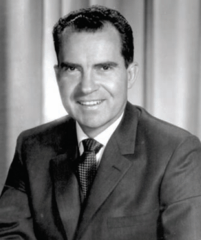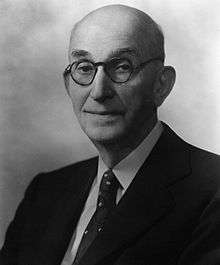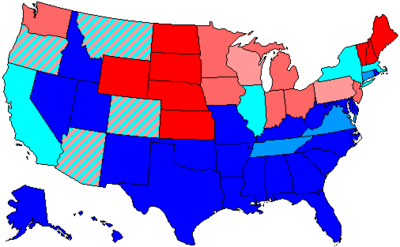87th United States Congress
| 87th United States Congress | |||||||||||||||||||||||||||||
| |||||||||||||||||||||||||||||
The Eighty-seventh United States Congress was a meeting of the legislative branch of the United States federal government, composed of the United States Senate and the United States House of Representatives. It met in Washington, D.C. from January 3, 1961 to January 3, 1963, during the first two years of the administration of U.S. President John Kennedy. The apportionment of seats in the House of Representatives was based on the Seventeenth Census of the United States in 1950, along with 2 seats temporarily added in 1959 (one member each from recently admitted states of Alaska and Hawaii). Both chambers had a Democratic majority.
Major events
- January 3, 1961: President Eisenhower severed diplomatic and consular relations with Cuba.
- January 20, 1961: Inauguration of President John Kennedy and Vice President Lyndon Johnson
- April 17, 1961: Bay of Pigs Invasion of Cuba began; it fails by April 19.
- May 4, 1961: Freedom Riders began interstate bus rides to test the new U.S. Supreme Court integration decision.
- May 5, 1961: Alan Shepard became the first American in space aboard Mercury-Redstone 3.
- May 25, 1961: President Kennedy announced his goal to put a man on the Moon before the end of the decade
- November 20: 1961: Funeral of Speaker Sam Rayburn, who died on November 16
- February 3, 1962: Embargo against Cuba was announced
- February 20, 1962: John Glenn became the first American to orbit the Earth
- March 26, 1962: Supreme Court ruled that federal courts could order state legislatures to reapportion seats (Baker v. Carr)
- October 1, 1962: James Meredith registered as the first black student at the University of Mississippi, escorted by Federal Marshals.
- October 14, 1962 - October 28, 1962: Cuban Missile Crisis
Major legislation
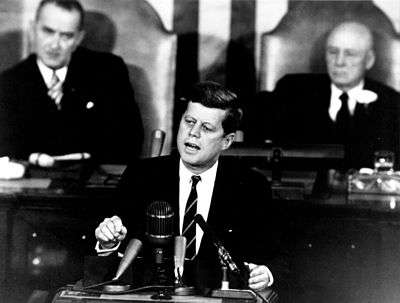
- May 1, 1961: Area Redevelopment Act, Pub.L. 87–27, 75 Stat. 47
- August 30, 1961 : Oil Pollution Act of 1961, Pub.L. 87–167, 75 Stat. 402
- September 4, 1961: The Foreign Assistance Act of 1961, Pub.L. 87–195, 75 Stat. 424
- September 13, 1961: Interstate Wire Act of 1961, Pub.L. 87–216, 75 Stat. 491
- September 21, 1961: Mutual Educational and Cultural Exchange Act of 1961, Pub.L. 87–256, 75 Stat. 527
- September 22, 1961: Peace Corps Act of 1961, Pub.L. 87–293, 75 Stat. 612
- September 26, 1961: Arms Control and Disarmament Act of 1961, Pub.L. 87–297, 75 Stat. 631
- October 15, 1961: Community Health Services and Facilities Act, Pub.L. 87–395, 75 Stat. 824
- March 15, 1962: Manpower Development and Training Act, Pub.L. 87–415, 76 Stat. 23
- June 28, 1962: Migration and Refugee Assistance Act, Pub.L. 87–510, 76 Stat. 121
- August 13, 1962: Communications Satellite Act, Pub.L. 87–624, 76 Stat. 419
- October 11, 1962: Trade Expansion Act, Pub.L. 87–794, 76 Stat. 872
- October 23, 1962: Bribery Act, Pub.L. 87–849, 76 Stat. 1119
- October 23, 1962: Vaccination Assistance Act of 1962, Pub.L. 87–868, 76 Stat. 1155
- October 23, 1962: River and Harbor Act of 1962,[1] Pub.L. 87–874, 76 Stat. 1173
Constitutional amendments
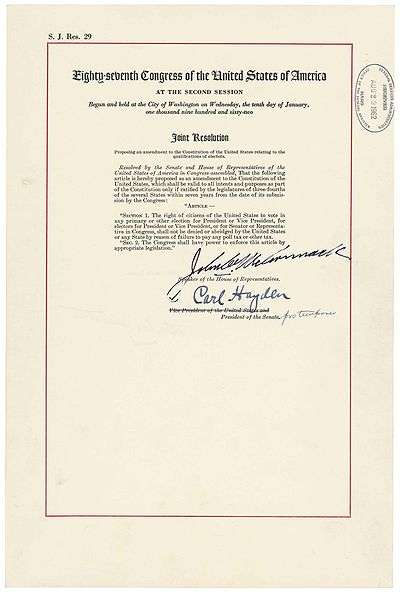
- March 29, 1961: The Twenty-third Amendment to the United States Constitution was ratified, allowing residents of Washington, D.C. to vote in presidential elections.
- August 27, 1962: The Twenty-fourth Amendment to the United States Constitution passed Congress, which would prohibit poll taxes in voting. It would be ratified by the states in the next Congress.
Party summary
Senate
| Party (shading shows control) |
Total | Vacant | ||
|---|---|---|---|---|
| Democratic (D) |
Republican (R) | |||
| End of the previous congress | 65 | 35 | 100 | 0 |
| Begin | 65 | 35 | 100 | 0 |
| End | 62 | 37 | 99 | 1 |
| Final voting share | 62.6% | 37.4% | ||
| Beginning of the next congress | 64 | 34 | 98 | 2 |
House of Representatives
| Party (shading shows control) |
Total | Vacant | |||
|---|---|---|---|---|---|
| Democratic (D) |
Republican (R) | Independent (I) | |||
| End of the previous congress | 283 | 153 | 1 | 437 | 0 |
| Begin | 264 | 173 | 0 | 437 | 0 |
| End | 261 | 434 | 3 | ||
| Final voting share | 60.1% | 39.9% | 0.0% | ||
| Beginning of the next congress | 258 | 176 | 1 | 435 | 0 |

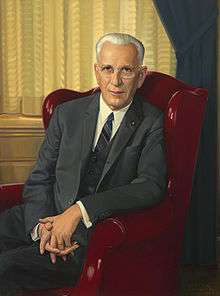
Leadership
Senate
- President: Richard Nixon (R), until January 20, 1961
- Lyndon Johnson (D), from January 20, 1961
- President pro tempore: Carl Hayden (D)
Majority (Democratic) leadership
Minority (Republican) leadership
House of Representatives
- Speaker: Sam Rayburn (D), until November 16, 1961
- John W. McCormack (D), from January 10, 1962
Majority (Democratic) leadership
- Majority Leader: John William McCormack until January 10, 1962
- Carl Albert, from January 10, 1962
- Majority Whip: Carl Albert
- Hale Boggs, from January 10, 1962
Minority (Republican) leadership
Caucuses
Members
Senate
Senators are popularly elected statewide every two years, with one-third beginning new six-year terms with each Congress. Preceding the names in the list below are Senate class numbers, which indicate the cycle of their election.
House of Representatives
The names of members of the House of Representatives are preceded by their district numbers.
Changes in membership
Senate
| State (class) |
Vacator | Reason for change | Successor | Date of successor's formal installation |
|---|---|---|---|---|
| Texas (2) |
William A. Blakley (D) | Successor elected June 14, 1961. Lost special election to fill the seat | John Tower (R) | June 15, 1961 |
| New Hampshire (2) |
Styles Bridges (R) | Died November 26, 1961 | Maurice J. Murphy, Jr. (R) | January 10, 1962 |
| Kansas (2) |
Andrew F. Schoeppel (R) | Died January 21, 1962 | James B. Pearson (R) | January 31, 1962 |
| South Dakota (3) |
Francis H. Case (R) | Died June 23, 1962 | Joseph H. Bottum (R) | July 9, 1962 |
| Idaho (2) |
Henry Dworshak (R) | Died July 23, 1962 | Leonard B. Jordan (R) | August 6, 1962 |
| Wyoming (2) |
John J. Hickey (D) | Successor elected November 6, 1962. Lost special election to fill the seat | Milward L. Simpson (R) | November 6, 1962 |
| Massachusetts (1) |
Benjamin A. Smith II (D) | Successor elected November 6, 1962 | Ted Kennedy (D) | November 7, 1962 |
| New Hampshire (2) |
Maurice J. Murphy, Jr. (R) | Successor elected November 6, 1962. Lost special election to fill the seat. | Thomas J. McIntyre (D) | November 7, 1962 |
| New Mexico (1) |
Dennis Chavez (D) | Died November 18, 1962 | Edwin L. Mechem (R) | November 30, 1962 |
| Oklahoma (2) |
Robert S. Kerr (D) | Died January 1, 1963 | Vacant | Not filled this term |
House of Representatives
| District | Vacator | Reason for change | Successor | Date successor seated |
|---|---|---|---|---|
| Arizona 2nd | Stewart Udall (D) | Resigned January 18, 1961 after being appointed United States Secretary of the Interior | Mo Udall (D) | May 2, 1961 |
| Arkansas 6th | William F. Norrell (D) | Died February 15, 1961 | Catherine Dorris Norrell (D) | April 18, 1961 |
| Pennsylvania 16th | Walter M. Mumma (R) | Died February 25, 1961 | John C. Kunkel (R) | May 16, 1961 |
| Tennessee 1st | B. Carroll Reece (R) | Died March 19, 1961 | Louise Goff Reece (R) | May 16, 1961 |
| Louisiana 4th | Overton Brooks (D) | Died September 16, 1961 | Joe Waggonner (D) | December 19, 1961 |
| Michigan 1st | Thaddeus M. Machrowicz (D) | Resigned September 18, 1961 after being appointed judge of the United States District Court for the Eastern District of Michigan | Lucien N. Nedzi (D) | November 7, 1961 |
| Texas 20th | Paul J. Kilday (D) | Resigned September 24, 1961 after being appointed judge of United States Court of Appeals for the Armed Forces | Henry B. Gonzalez (D) | November 4, 1961 |
| Michigan 14th | Louis C. Rabaut (D) | Died November 12, 1961 | Harold M. Ryan (D) | February 13, 1962 |
| Texas 4th | Sam Rayburn (D) | Died November 16, 1961 | Ray Roberts (D) | January 30, 1962 |
| Texas 13th | Frank N. Ikard (D) | Resigned December 15, 1961 | Graham B. Purcell, Jr. (D) | January 27, 1962 |
| New York 6th | Lester Holtzman (D) | Resigned December 31, 1961 after being appointed judge of the New York Supreme Court | Benjamin S. Rosenthal (D) | February 20, 1962 |
| South Carolina 2nd | John J. Riley (D) | Died January 1, 1962 | Corinne Boyd Riley (D) | April 10, 1962 |
| New Jersey 11th | Hugh J. Addonizio (D) | Resigned June 30, 1962 after being elected Mayor of Newark | Vacant | Not filled this term |
| California 1st | Clement W. Miller (D) | Died October 7, 1962 | Vacant | Not filled this term |
| Mississippi 3rd | Frank E. Smith (D) | Resigned November 14, 1962 | Vacant | Not filled this term |
Committees
Lists of committees and their party leaders.
Senate
- Aeronautical and Space Sciences
- Agriculture and Forestry
- Appropriations
- Banking and Currency
- Commerce
- District of Columbia
- Finance
- Foreign Relations
- Government Operations
- Interior and Insular Affairs
- Interstate and Foreign Commerce
- Judiciary
- Labor and Public Welfare
- National Fuels Study (Special)
- National Water Resources (Select)
- Post Office and Civil Service
- Public Works
- Small Business (Select)
- Subcommittee on Internal Security
- Whole
House of Representatives
- Agriculture
- Appropriations
- Banking and Currency
- District of Columbia
- Education and Labor
- Foreign Affairs
- Government Operations
- House Administration
- Interior and Insular Affairs
- Merchant Marine and Fisheries
- Post Office and Civil Service
- Public Works
- Rules
- Science and Astronautics
- Small Business (Select)
- Standards of Official Conduct
- Un-American Activities
- Veterans' Affairs
- Ways and Means
- Whole
Joint committees
- Atomic Energy
- Conditions of Indian Tribes (Special)
- Construction of a Building for a Museum of History and Technology for the Smithsonian
- Defense Production
- Economic
- Immigration and Nationality Policy
- Legislative Budget
- The Library
- Navajo-Hopi Indian Administration
- Printing
- Reduction of Nonessential Federal Expenditures
- Taxation
Employees and legislative agency directors
Legislative branch agency directors
- Architect of the Capitol: J. George Stewart
- Attending Physician of the United States Congress: George Calver
- Comptroller General of the United States: Joseph Campbell
- Librarian of Congress: Lawrence Quincy Mumford
- Public Printer of the United States: Raymond Blattenberger (until 1961), James L. Harrison (starting 1961)
Senate
- Chaplain: Frederick Brown Harris (Methodist)
- Parliamentarian: Charles Watkins
- Secretary: Felton McLellan Johnston
- Sergeant at Arms: Joseph C. Duke
House of Representatives
- Chaplain: Bernard Braskamp (Presbyterian)
- Clerk: Ralph R. Roberts
- Doorkeeper: William Mosley "Fishbait" Miller
- Parliamentarian: Lewis Deschler
- Postmaster: H. H. Morris
- Sergeant at Arms: Zeake W. Johnson, Jr.
See also
- United States elections, 1960 (elections leading to this Congress)
- United States elections, 1962 (elections during this Congress, leading to the next Congress)
References
- Martis, Kenneth C. (1989). The Historical Atlas of Political Parties in the United States Congress. New York: Macmillan Publishing Company.
- Martis, Kenneth C. (1982). The Historical Atlas of United States Congressional Districts. New York: Macmillan Publishing Company.
External links
- Biographical Directory of the U.S. Congress
- U.S. House of Representatives: Congressional History
- U.S. Senate: Statistics and Lists
- House of Representatives Session Calendar for the 87th Congress (PDF).
- Official Congressional Directory for the 87th Congress, 1st Session.
- Official Congressional Directory for the 87th Congress, 2nd Session.
- Pocket Congressional Directory for the 87th Congress.

